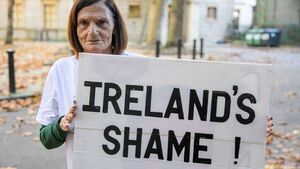Carlow woman on hunger strike at Dáil vows to continue protest

Hunger striker Mary Dunlevy Greene from Carlow on Kildare Street, Dublin. Photo: Gareth Chaney
A CARLOW town woman who is on her 40th day of hunger strike outside the Dáil has told she will continue her protest until the Irish state lives up to promises it made 26 years ago.
Mary Dunlevy Greene (73) is one of four survivors of industrial schools on hunger strike over what they say are failed promises of supports from successive governments.
Ms Dunlevy Greene said: “We were starved as children, so starving is not an issue for us. We know what starvation is like.”
Medical professionals monitoring the group’s health have warned that they are putting their lives in danger, as they are surviving solely on water, vitamins and coffee.
The four protestors are also sleeping rough, having set up a makeshift campsite close to the Dáil.
Ms Greene was placed in the Mount St Vincent Industrial School, Co Limerick when she was aged four. Ms Greene described her industrial school as “a cold, regimented way of life. We did what we were told when we were told. We had no birthdays, no Christmases, we celebrated nothing. It was completely savage”.
She also remembers being regularly beaten at the school.
Throughout her time there, the inmates never saw a doctor, dentist or nurse, and did not get medical care, she claimed.
Ms Dunlevy Greene said that many of her contemporaries who spent time in industrial schools had died prematurely.
“Most of them didn’t reach old age; the youngest cohort of industrial school survivors alive today are in their mid-to-late 50s. I’m 73, and there aren’t very many that are older than me,” she explained.
The survivors claim that they were promised medical cards and contributory pensions 26 years ago when then-taoiseach Bertie Ahern issued an apology on behalf of the Irish state, but say they are yet to receive them.
Among other things, the medical cards would enable people to receive care at home rather than having to go into a nursing home.
“Anyone that was institutionalised as a child never wants to end up institutionalised in their old age,” said Ms Dunlevy Greene.
The campaign has received support from several TDs, including president-elect Catherine Connolly, who criticised the “mean-spirited” treatment of survivors by the government at Leader’s Questions earlier this month.
In response, justice minister Jim O’Callaghan said that he would raise the issue with education minister Helen McEntree, but said that it was “unfair to suggest that the state doesn’t step up to these issues”.
Both Mr O’Callaghan and Ms Connolly urged the four protestors to end their hunger strike on health grounds.
Ms Dunlevy Greene told : “What else can we do? We will sit here and wait until they come back from their midterm break. On 1 November we will be on day 44 of our hunger strike. We’re quite prepared for it. Every time we get a push back, our spirits get higher.”
The three survivors who are on hunger strike alongside her are Maurice Patton O’Connell (57), Mary Donovan (57) and Miriam Moriarty Owens (68) who were placed as children in the Pembroke Alms Industrial School in Kerry.




